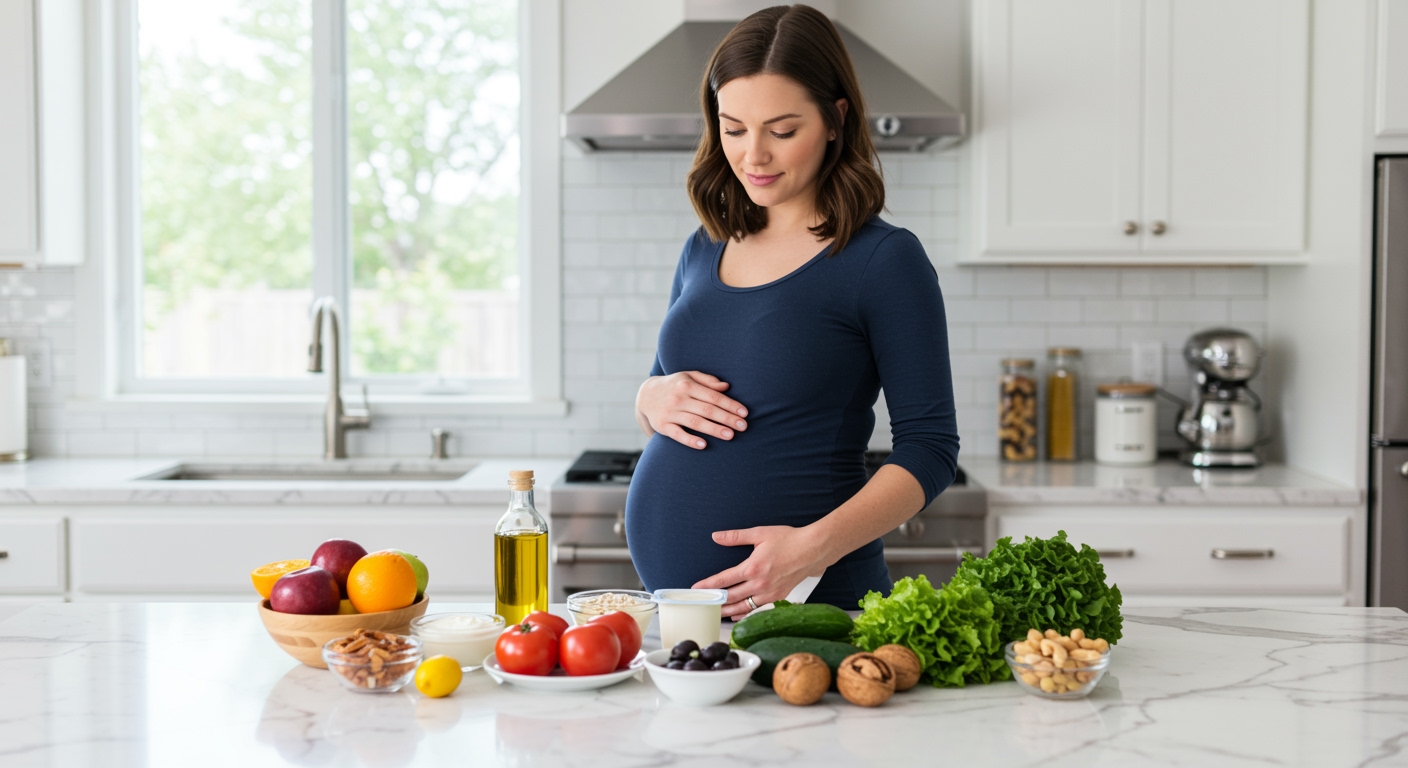✪ Key Highlight: Greek study shows Mediterranean diet during pregnancy reduces baby food allergy risk through specific food choices.
Introduction
Food allergies in babies are skyrocketing across Western countries.
A groundbreaking Greek study published in the journal Allergy reveals that mothers following a Mediterranean diet during pregnancy and breastfeeding significantly reduce their babies’ risk of developing food allergies.
Hi, I’m Abdur, your nutrition coach and today I’m going to analyze this important research that tracked 430 mothers across six Greek regions to understand how maternal diet shapes infant immune health.
What Foods Actually Protect Babies From Allergies?
The Mediterranean diet focuses on whole foods that naturally support immune development.
Mothers who ate more than eight servings of fruit weekly during pregnancy had babies with lower allergy rates.
Full-fat dairy consumption proved crucial, with mothers eating more than fifteen servings weekly showing the strongest protective effects.
Olive oil emerged as another key player, providing healthy fats that support proper immune system development in growing babies.
During breastfeeding, mothers who consumed more than twelve servings of vegetables weekly provided maximum protection for their infants.
These foods contain antioxidants and anti-inflammatory compounds that help shape the developing immune system during critical early months.
The research shows that timing matters, with both pregnancy and breastfeeding periods being crucial windows for dietary intervention.
✪ Pro Tip: Focus on variety within Mediterranean foods rather than restricting your diet during pregnancy.
Which Foods Increase Baby Allergy Risk?
The study revealed surprising findings about foods that increase allergy risk in babies.
Mothers eating more than three servings of red meat or poultry weekly during pregnancy had babies with higher allergy rates.
Fish consumption above one serving per week actually increased allergy risk, contradicting previous research.
Researchers suggest that environmental pollutants in fish might explain this unexpected finding.
These animal proteins may trigger inflammatory responses that interfere with proper immune system development.
The high saturated fat content in red meat and poultry could promote inflammation during critical developmental periods.
During breastfeeding, continued high intake of these proteins maintained the increased allergy risk for infants.
✪ Fact: Environmental toxins in fish may outweigh their omega-3 benefits during pregnancy.
How Does Maternal Diet Shape Baby Immune System?
Your diet during pregnancy directly influences your baby’s immune development through multiple pathways.
Nutrients cross the placenta and help program immune cells in the developing fetus.
During breastfeeding, dietary compounds pass through breast milk and continue shaping the infant’s gut microbiome.
The gut microbiome plays a crucial role in training the immune system to distinguish between harmful and harmless substances.
Mediterranean diet foods provide prebiotic fibers that feed beneficial bacteria in both mother and baby.
Antioxidants from fruits and vegetables help reduce chronic inflammation that can interfere with proper immune tolerance development.
This early programming creates lasting effects on how the child’s immune system responds to foods throughout life.
✪ Note: The first 1000 days from conception are critical for immune system programming.
What Are The Study Limitations And Future Research?
This Greek study provides valuable insights but has important limitations to consider.
The retrospective design relies on mothers remembering their diets accurately, which can introduce recall bias.
The results may not apply to non-Mediterranean populations with different genetic backgrounds and food cultures.
Confounding factors like socioeconomic status, education level, and overall lifestyle patterns could influence the results.
The sample size of 430 mothers, while substantial, represents only Greek populations across six regions.
Future intervention trials are needed to test whether prescribing Mediterranean diets to pregnant women actually prevents allergies.
Research in diverse populations will help determine if these benefits extend beyond Mediterranean genetic and cultural contexts.
✪ Fact: Food allergy rates affect up to 10% of children in Western countries today.
The Bottom Line
This Greek research adds compelling evidence that maternal diet during pregnancy and breastfeeding significantly influences baby food allergy risk.
Prevention through nutrition is always more powerful than treatment after problems develop, and this study shows how simple dietary choices can protect your child’s future health.
What questions do you have about Mediterranean diet during pregnancy, or have you noticed any connections between your diet and your baby’s health? Share your thoughts in the comments below.
References
At NutritionCrown, we use quality and credible sources to ensure our content is accurate and trustworthy. Below are the sources referenced in writing this article:
- News Medical: Mediterranean diet during pregnancy cuts babies’ food allergy risk
- NDTV Health: Mediterranean Diet During Pregnancy May Cut Baby’s Food Allergy Risk: New Study
- Wiley Online Library: Maternal adherence to Mediterranean diet during pregnancy and lactation and food allergy in infants
- PubMed: Mediterranean diet and food allergies research
- Nature: Maternal diet and infant immune development





